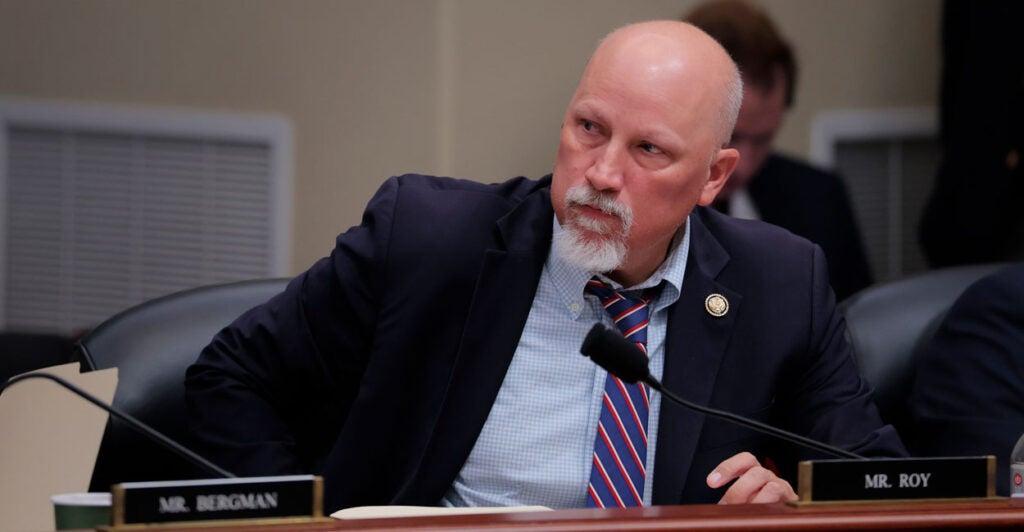A bipartisan group of House members, including the chamber’s most conservative and most liberal members, said at a press conference Wednesday that they have a bill to end the problem of insider trading of stocks by members of Congress.
Introducing the Restore Trust in Congress Act, Rep. Chip Roy, R-Texas, said that it “takes the best elements of all of our legislation, puts it together to restrict and limit and ban trading of stocks by individual members of Congress.”
“Capitol Trades, for example, reports that 113 members of Congress made 9,261 trades in 2024 involving 706 million shares of other assets,” said Roy, referring to a website that tracks members of Congress’ finances. “That’s not why people sent us here to Washington. … If you want to day-trade, leave Congress.”
Roy has long pushed for a ban on members trading stocks, having introduced the “Trust in Congress Act” with former Rep. Abigail Spanberger, D-Va., in 2020.
But this time, Roy says he’ll get a vote.
“We’re going to get a vote on it. This is a nondebatable proposition,” he said.
A Bipartisan Effort
Joining him at the rare bipartisan press conference was Rep. Alexandria Ocasio-Cortez, D-N.Y., who called their cooperation “one of those rare moments where I feel like Washington is working the way that it’s supposed to work.”
Rep. Tim Burchett, R-Tenn., joked that he didn’t “agree with some of these people on anything” and that “if Cortez told me the sun was coming up tomorrow, I’d go out and check it out.”
The members boasted of the bill’s closing of loopholes, which it does by applying the law to spouses and by prohibiting not just trading stocks but also owning them.

In the bill, it appears Democrats and Republicans have tabled some of the major disagreements that have stunted efforts for a stock trading ban in the past.
In the Senate, the two parties have yet to advance the HONESTY Act for a floor vote, which prohibits stock trading for both members of Congress and—at Democrats’ insistence—for the president and vice president. President Donald Trump has argued the bill targets him unfairly.
Rep. Seth Magaziner, D-R.I., told reporters he was willing to set this issue aside for the time being in the interests of passing the bill.
“To be clear, we are not saying that the president and the vice president aren’t going to be included in the end product,” he said. “What we’re saying is, we’re starting the process now, hopefully through regular order, through committees, and if we can get the critical mass of support to include the president and vice president, we will put an amendment and we will do that.”
He added, “One of our operating principles was not to let the perfect be the enemy of the good. Like, let’s get the strongest reform that we possibly can get passed with a realistic shot of getting done this Congress.”
Can the Bill Be Enforced?
One of the quirks of the bill is that it sets out to address a practice which, under current rules and laws, is already regulated.
Members of Congress are—in theory—supposed to report their business dealings, and insider trading is a crime. If members followed the rules and laws already on the books, there would not be much need for the bill.
But Magaziner told The Daily Signal he’s confident in the new bill’s enforcement mechanisms. He explained them after the press conference.
“Those of us who were in the rooms negotiating felt it was very important that, No. 1, the House administer its own discipline, rather than the executive branch. … Having another branch police the rules of the House could become very political and very problematic,” he told The Daily Signal.

Magaziner added, “The Ethics Committee is going to be in charge of enforcing this. However, we also recognize the fact that the Ethics Committee often moves slowly is sort of a black box, and so we deal with that by being very prescriptive in the bill about what constitutes a violation and what the consequences should be.”
Magaziner explained that members caught trading stocks would have to “turn over any profits that [they] made off the trade, plus a 10% fine on the value of the trade. So, if you trade $100,000 worth of stock, you have to give up your profit, plus $10,000.”
One thing the members said they were most in favor of is getting a vote on the bill.
Rep. Anna Paulina Luna, R-Fla., said that if the House leadership does not put the bill on the floor, “there is a discharge petition prepared and ready to go,” referring to a legislative tool used to bypass House leadership and force consideration of a bill.








